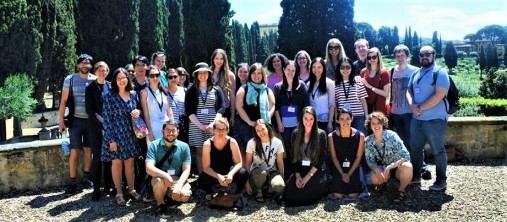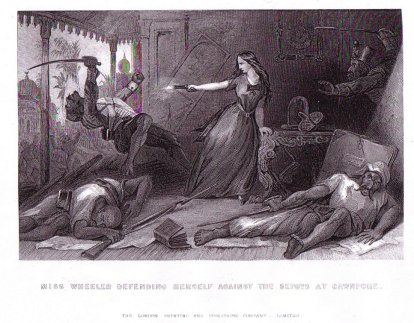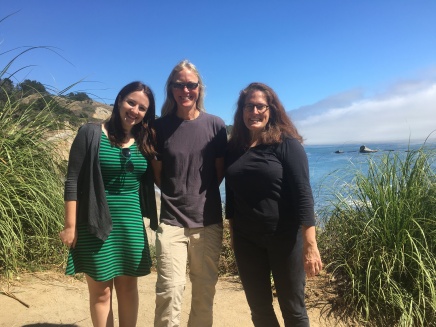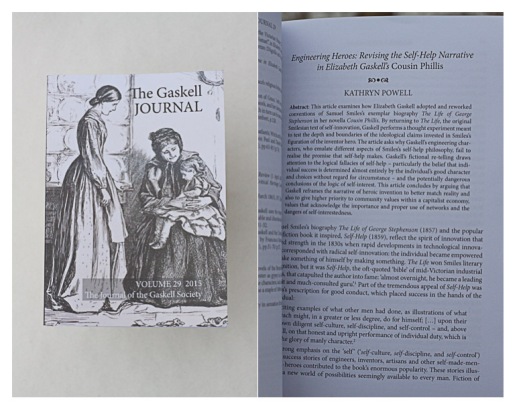Earlier this month, Professor Nancy Henry and graduate students Staci Poston Conner, Julie Cruz, and Alli Clymer attended Dickens Universe at the University of California-Santa Cruz. For the first time, this year’s conference centered on a novel not written by Dickens, George Eliot’s Middlemarch, and raised cross-disciplinary questions about Eliot, Dickens, Victorian studies, and the field’s role in academia more generally.
Nancy Henry has been taking graduate students with her to the “Universe” since 2009, when she joined the UTK faculty. As first co-organizer of this year’s event, Henry, along with Jonathan Grossman (UCLA), selected such lecturers as David Kurnick (Rutgers University), Jill Galvan (Ohio State University), Helena Michie (Rice University), and George Levine (Rutgers University).
This year’s UT participants also attended a three-day conference prior to the Universe titled “Form and Reform,” which featured a series of talks, panels, and synthesis sessions discussing the “form” of Victorian reform as well as the ways in which current debates about form and formalism in Victorian Studies open the door to this dimension of the word “reform,” and they urge us to re-consider their relation.

Clymer and Conner in front of this year’s banner
In-between the the lectures that bookended most days, Universe scholars from across the world participated in literary and professional seminars, workshops, and various other activities.
Graduate student Staci Poston Conner attended a graduate student seminar led by James Buzard (MIT) and Monique Morgan (Indiana University-Bloomington):
“The seminar provided time to discuss Middlemarch in detail, much in the way we would in the classroom but with a focus on topics that had been brought up in other lectures and discussions during the conference. We were able to spend time with individual paragraphs and sentences, engaging in close reading activities that enhanced our understanding and appreciation of the novel, ranging from the well-loved ‘squirrel’s heartbeat’ passage to the little-discussed character Timothy Cooper. James and Monique led and contributed to helpful discussions while also keeping us on topic as we attempted (but, much like Middlemarch’s Casaubon, ultimately failed) to make it through the ‘topics to discuss’ list we covered the chalkboard with during our first meeting.”
Staci also participated in a publication workshop led by Ryan Fong (Kalamazoo College) and Kathleen Frederickson (UC-Davis):
“In this extremely helpful publication workshop, we started by talking about ‘blocks’ to publishing, which let us air our anxieties about everything from the job market to time management. We discussed genre issues, such as the differences between a seminar paper, journal article, and dissertation chapter. We also focused on different types of journals in order to better understand how articles can be framed differently for those focused on an historical period versus those focused on a specific genre or author. Ryan and Kathleen led us through exercises to determine what part of our arguments might be ‘portable’ for this purpose and prompted us to voice our ideas in new ways. Jonathan Grossman, Rae Greiner, and Monique Morgan visited on the last day and provided a behind-the-scenes view of academic journals from editors’ perspectives. They offered practical advice ranging from choosing publications to understanding readers’ reports.”
During this busy week, Staci also attended the one-day professionalization seminar on dissertations led by Catherine Robson (NYU).
“She organized the session around the different shapes that a large writing project can take, drawing out her own dissertation and book projects on the chalkboard as examples. Catherine described various ways to think of organizing or shaping projects, such as a historical arc, a case study, a funnel, an explosion, or even a fractal. Towards the end of the session, students who wanted to share were encouraged to map their own projects out on the board. This part of the session was immensely helpful, as we got to see three different dissertations-in-progress put into shapes on the board while Catherine offered helpful guiding questions and suggestions for ways to position and draw ideas. This session helped me think about my own dissertation in new ways, giving me ideas for mapping exercises that will not only help me organize my ideas but also conceptualize my larger project.”
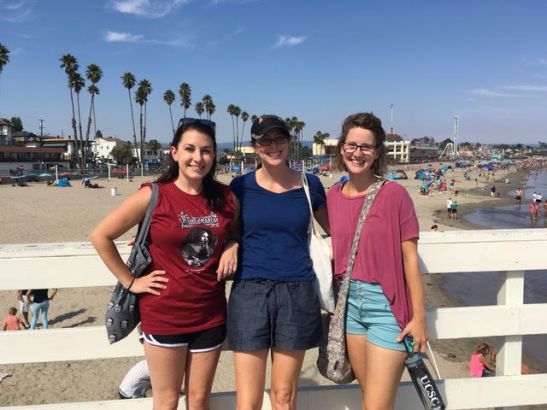
Conner, Cruz, and graduate student Emily Corey (OSU) enjoying a well-earned break at the beach
Julie Cruz, on the other hand, attended a graduate seminar led by Zoe Beenstock (University of Haifa) and David Kurnick (Rutgers University):
“Attending the graduate seminar allowed me to dive into the complicated tone of the narrator in Middlemarch, examining passages of humor and irony aimed at both the characters in the book as well as, at times, the reader. As a group, we discussed the impact of a narrator with an intentionally disguised tone at times, reflecting on how the narrator functions in conjunction with larger thematic qualities. The seminar allowed me to express my particular area of interest in the novel while getting feedback from others on how I constructed my ideas. This, along with several other discussion opportunities throughout the week, let me network with fellow graduate students attending other universities, a number of whom I am still in contact with.”
Julie also attended a seminar on delivering conference papers led by Robyn Warhol (Ohio State University) and Simon Rennie (University of Exeter):
“The seminar on delivering papers delved into both political and practical issues. We began the seminar by discussing up-speak and voice fry, as well as the gendering controversy surrounding the acceptable use of such speech patterns. Then we moved onto the practical issues: what do you do if you realize mid-presentation that you are missing pages? (bring an outline with you and have all topic sentences memorized); how do you monitor pacing and adjust your paper as time runs out (mark places in the paper in which to pause and paragraphs which can be skipped). These tips and tricks made me much less nervous about delivering a paper, and also allowed me to think through the role presentations and conference papers play in the profession. I was able to think through my delivery style so that, in the future, more of the focus will be on what I say, not on how I say it.”
Graduate student Alli Clymer, however, took on a different role at this year’s Dickens Universe. Serving as one of the “Cruise Directors,” or graduate social organizers, along with Frances Molyneux (Stanford University) and Darby Walters (USC):
“As a Dickens Universe Cruise Director, I planned and facilitated daily events for graduate and faculty to network and socialize during this week-long conference. Our ultimate goal was to provide fun and innovative opportunities for attendees to engage creatively and collaboratively with this year’s selected novel, Eliot’s Middlemarch, and cultivate meaningful social and professional relationships.”
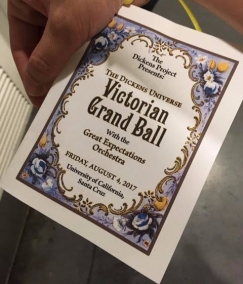 Although most of the Dickens Universe days were filled with lectures, talks, workshops, and seminars, the UTK attendees also made time for the Universe’s festive activities, including PPPs (post-prandial potations), Victorian high teas, a Grand Party filled with extravagant cheeses and desserts, and a Victorian dance (with period dress, music, and dancing!).
Although most of the Dickens Universe days were filled with lectures, talks, workshops, and seminars, the UTK attendees also made time for the Universe’s festive activities, including PPPs (post-prandial potations), Victorian high teas, a Grand Party filled with extravagant cheeses and desserts, and a Victorian dance (with period dress, music, and dancing!).
Students who attend the Universe are also fully funded for attendance at the corresponding Dickens Project Winter Conference the following year.
**UT students need not be specialists in Dickens or even in Victorian literature to attend the conference, but students who have attended the Universe have also participated in the Nineteenth-Century British Research Seminar. Applications to represent UTK at the Dickens Universe are usually solicited in February by Professor Nancy Henry.**
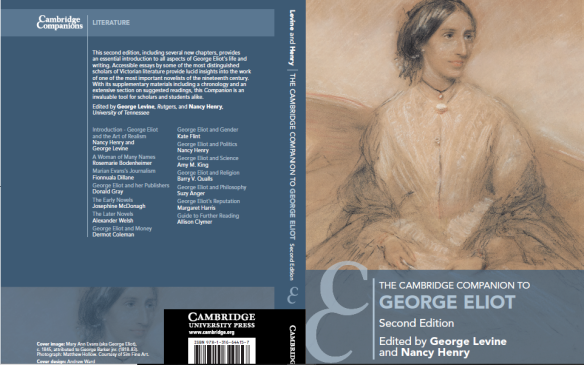 This second edition of The Cambridge Companion to George Eliot includes several new chapters, providing an essential introduction to all aspects of Eliot’s life and writing. Accessible essays by some of the most distinguished scholars of Victorian literature provide lucid and original insights into the work of one of the most important writers of the nineteenth century, author most famously of Middlemarch, Adam Bede, The Mill on the Floss, and Daniel Deronda. From an introduction that traces her originality as a realist novelist, the book moves on to extensive considerations of each of Eliot’s novels, her life and her publishing history. Chapters address the problems of money, philosophy, religion, politics, gender and science, as they are developed in her novels. With its supplementary materials, including a chronology and an extensive section of suggested readings, this Companion is an invaluable tool for scholars and students alike.
This second edition of The Cambridge Companion to George Eliot includes several new chapters, providing an essential introduction to all aspects of Eliot’s life and writing. Accessible essays by some of the most distinguished scholars of Victorian literature provide lucid and original insights into the work of one of the most important writers of the nineteenth century, author most famously of Middlemarch, Adam Bede, The Mill on the Floss, and Daniel Deronda. From an introduction that traces her originality as a realist novelist, the book moves on to extensive considerations of each of Eliot’s novels, her life and her publishing history. Chapters address the problems of money, philosophy, religion, politics, gender and science, as they are developed in her novels. With its supplementary materials, including a chronology and an extensive section of suggested readings, this Companion is an invaluable tool for scholars and students alike.
 Henry’s Women, Literature and Finance in Victorian Britain: Cultures of Investment defines the cultures that emerged in response to the democratization of the stock market in nineteenth-century Britain when investing provided access to financial independence for women. Victorian novels represent those economic networks in realistic detail and are preoccupied with the intertwined economic and affective lives of characters. Analyzing evidence about the lives of real investors together with fictional examples, including case studies of four authors who were also investors, Nancy Henry argues that investing was not just something women did in Victorian Britain; it was a distinctly modern way of thinking about independence, risk, global communities and the future in general.
Henry’s Women, Literature and Finance in Victorian Britain: Cultures of Investment defines the cultures that emerged in response to the democratization of the stock market in nineteenth-century Britain when investing provided access to financial independence for women. Victorian novels represent those economic networks in realistic detail and are preoccupied with the intertwined economic and affective lives of characters. Analyzing evidence about the lives of real investors together with fictional examples, including case studies of four authors who were also investors, Nancy Henry argues that investing was not just something women did in Victorian Britain; it was a distinctly modern way of thinking about independence, risk, global communities and the future in general.

 Although most of the Dickens Universe days were filled with lectures, talks, workshops, and seminars, the UTK attendees also made time for the Universe’s festive activities, including PPPs (post-prandial potations), Victorian high teas, a Grand Party filled with extravagant cheeses and desserts, and a Victorian dance (with period dress, music, and dancing!).
Although most of the Dickens Universe days were filled with lectures, talks, workshops, and seminars, the UTK attendees also made time for the Universe’s festive activities, including PPPs (post-prandial potations), Victorian high teas, a Grand Party filled with extravagant cheeses and desserts, and a Victorian dance (with period dress, music, and dancing!).

 Later that day, Clymer also participated in a position-paper seminar on “Science, Technology and Animals,” led by professors
Later that day, Clymer also participated in a position-paper seminar on “Science, Technology and Animals,” led by professors 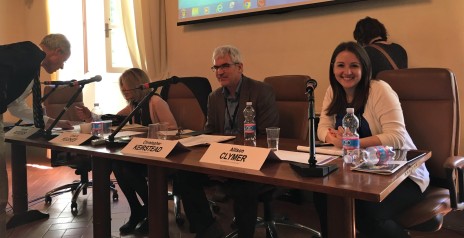 In addition to the conference, Henry and Clymer also took part in a series of professionalization workshops before and after the conference designed to help graduate students think critically and strategically about the academic profession, from grants and publications, to jobs and tenure. Henry, alongside professors Robson and
In addition to the conference, Henry and Clymer also took part in a series of professionalization workshops before and after the conference designed to help graduate students think critically and strategically about the academic profession, from grants and publications, to jobs and tenure. Henry, alongside professors Robson and 
